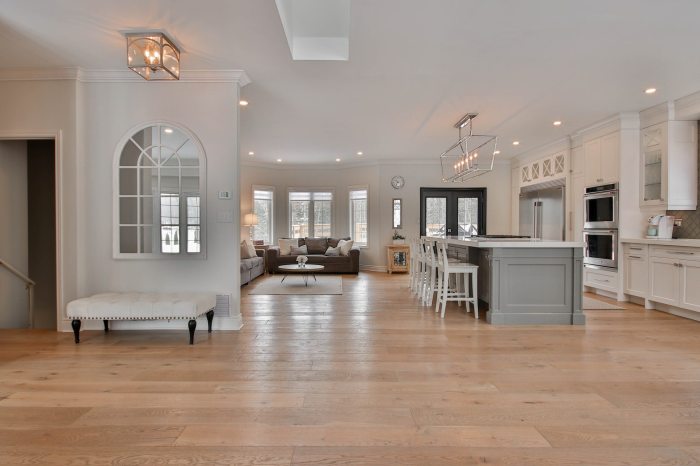The Ultimate Guide to the Best Flooring for Home Remodel
Embark on a journey through the world of home remodeling with a focus on finding the perfect flooring. From durable hardwood to versatile vinyl, discover how choosing the right flooring can transform any space into a stylish and functional sanctuary.
Types of Flooring Materials
When it comes to choosing the right flooring material for your home remodel, there are several options to consider. Each type of flooring material has its own unique characteristics that can impact the durability and aesthetic appeal of your space.
Hardwood Flooring
Hardwood flooring is a classic choice that adds warmth and elegance to any room. It is known for its durability and long-lasting quality. Hardwood floors can be refinished multiple times, making them a great investment for your home. They are perfect for living rooms, dining rooms, and bedrooms.
Laminate Flooring
Laminate flooring is a cost-effective alternative to hardwood that mimics the look of wood. It is easy to install and maintain, making it a popular choice for high-traffic areas like kitchens and hallways. Laminate flooring is also resistant to scratches and stains, making it a practical option for busy households.
Vinyl Flooring
Vinyl flooring is a versatile and affordable option that comes in a wide range of designs and styles. It is water-resistant and easy to clean, making it ideal for bathrooms, kitchens, and basements. Vinyl flooring can replicate the look of hardwood, tile, or stone, giving you plenty of options to match your home decor.
Tile Flooring
Tile flooring is a durable and low-maintenance option that is perfect for areas prone to moisture, such as bathrooms and kitchens. It comes in a variety of materials, including ceramic, porcelain, and natural stone, each offering a unique look and feel.
Tile flooring can add a touch of luxury to your home and is available in endless design possibilities.
Considerations for Choosing Flooring
When selecting the best flooring for a home remodel, there are several factors to consider to ensure you make the right choice. These factors include durability, maintenance, cost, and style, all of which play a crucial role in the decision-making process.
The choice of flooring can significantly impact the overall ambiance and functionality of a living space, so it is essential to carefully evaluate each factor before making a decision.
Importance of Durability
Durability is a key factor to consider when choosing flooring for your home. It is important to select a material that can withstand daily wear and tear, especially in high-traffic areas. Factors such as the material's resistance to scratches, stains, and moisture should be taken into account to ensure the flooring lasts for years to come.
Maintenance Considerations
Maintenance requirements vary depending on the type of flooring material chosen. Some materials may require regular cleaning and upkeep, while others are more low-maintenance. Consider how much time and effort you are willing to invest in maintaining your floors when making a decision.
Cost Analysis
Cost is another critical factor to consider when choosing flooring for your home. Different materials come with varying price tags, so it is essential to set a budget and explore options that fit within your financial constraints. Remember to consider not just the upfront cost but also the long-term maintenance expenses associated with each type of flooring.
Style and Design Elements
The style and design of the flooring play a significant role in the overall aesthetics of your home. Consider the existing decor and furniture in your space when selecting a flooring material to ensure it complements the overall design scheme.
Whether you prefer a modern, traditional, or rustic look, there are various flooring options available to match your style preferences.
Flooring Installation Methods

When it comes to installing flooring in your home, there are various methods depending on the type of material you choose. Whether you opt for hardwood, laminate, vinyl, tile, or carpet, each material requires a specific installation process to ensure durability and longevity.
DIY Flooring Installation
For homeowners looking to save on installation costs, there are DIY options available for certain types of flooring
Professional Installation Benefits
While DIY installation can be cost-effective, there are several benefits to opting for professional installation. Professionals have the experience and expertise to ensure that the flooring is installed correctly, minimizing the risk of mistakes that could lead to costly repairs down the line.
Additionally, professional installation often comes with warranties that can provide peace of mind and protection in case of any issues with the flooring in the future. Overall, professional installation offers convenience, efficiency, and a higher level of quality compared to DIY projects.
Maintenance and Care Tips
Proper maintenance and care are essential to ensure the longevity and beauty of your flooring. Different types of flooring require specific care routines and cleaning methods to keep them looking their best. Here are some tips to help you maintain and care for hardwood, laminate, vinyl, and tile floors.
Hardwood Flooring
- Regularly sweep or vacuum your hardwood floors to remove dust and debris that can scratch the surface.
- Use a damp mop with a hardwood floor cleaner to clean spills and stains, but avoid using excess water to prevent damage.
- Apply a protective finish to your hardwood floors every few years to maintain their shine and protect them from wear.
Laminate Flooring
- Use a dry mop or vacuum with a soft brush attachment to clean laminate floors and avoid scratching the surface.
- Avoid using excessive water when cleaning laminate floors, as it can cause the planks to swell and warp.
- Wipe up spills immediately to prevent them from seeping into the seams and causing damage to the floor.
Vinyl Flooring
- Sweep or vacuum vinyl floors regularly to remove dirt and debris that can cause scratches over time.
- Mop vinyl floors with a mixture of warm water and a mild detergent to keep them clean and free of stains.
- Avoid using harsh chemicals or abrasive cleaners that can damage the surface of vinyl flooring.
Tile Flooring
- Clean tile floors with a mild detergent and warm water using a soft mop or sponge to avoid scratching the tiles.
- Seal grout lines regularly to prevent moisture and dirt from seeping in and causing discoloration or mildew growth.
- Use a designated tile cleaner for tough stains or grime that regular cleaning methods can't remove.
Protecting High-Traffic Areas
- Place rugs or mats in high-traffic areas to protect the flooring from excessive wear and tear.
- Use furniture pads under heavy pieces to prevent scratches and indentations on the floor surface.
- Regularly trim pets' nails to avoid scratches on hardwood, laminate, or vinyl floors.
Closure
As we conclude our exploration of the best flooring options for home remodel, remember that the foundation of your space sets the tone for its overall ambiance. Selecting the ideal flooring is not just about aesthetics, but also about durability and maintenance, ensuring a space that is both beautiful and practical.
Popular Questions
Which flooring material is best for high-traffic areas?
Laminate and vinyl flooring are great choices for high-traffic areas due to their durability and easy maintenance.
Can hardwood flooring be installed in bathrooms?
While hardwood flooring can add a touch of elegance to a bathroom, it's important to choose engineered hardwood that can withstand moisture.
What is the average lifespan of tile flooring?
With proper maintenance, tile flooring can last for several decades, making it a long-lasting and cost-effective option.




